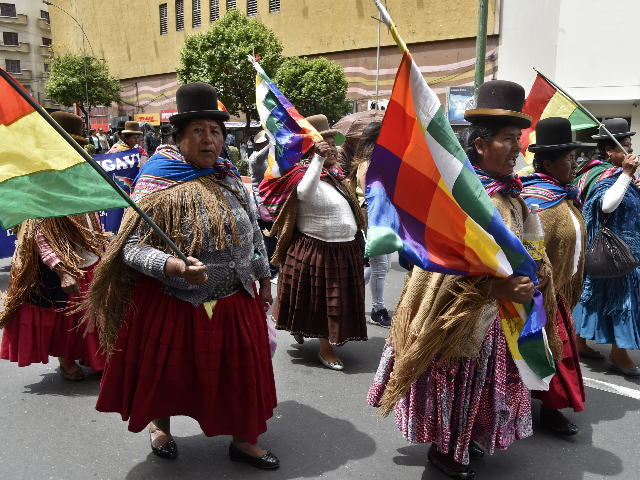The acting president of Bolivia, Jeanine Áñez Chávez, appointed Martha Yujra Apaza, an indigenous woman, her minister of culture on Thursday, in a move likely intended to help heal the country’s deep racial divisions.
Apaza, the former leader of the Regional Labor Center of El Alto, was sworn in at the hall of the Presidential Burned Palace on Thursday, alongside five other ministers who will join the 11 ministers already appointed to Áńez’s cabinet.
In her acceptance speech, she promised to help “consolidate the peace process” and “establish the clear path to free elections.”
“Bolivians must be in no doubt that this is a government that only intends to fulfill their demands by reconciling our people and strengthening the dialogue,” she said. “We must not think of ourselves, but think of our to help make the country grow. The time has come for the word of God to enter the presidential palace.”
Yujra’s appointment follows criticism from supporters of socialist ex-President Evo Morales, who noted that Añez had not appointed any indigenous people to her cabinet, despite the fact that 40 percent of Bolivians belong to 36 separate indigenous groups.
Morales, who resigned on Sunday evening following the publication of proof of fraud in the election that unconstitutionally extended his tenure, was Bolivia’s first indigenous president. He held widespread support among native communities whose votes facilitated his rise to power in 2006.
Áñez’s initial round of appointees included prominent business figures from Santa Cruz, Bolivia’s financial center. It is also the country’s most heavily populated city, where are a majority of residents are mestizos, many of whom were hostile to Evo Morales.
“We leave behind those times in which ethnic and class resentments which divide Bolivians are used as an instrument of political control,” said Bolivia’s new foreign minister, Karen Longaric, in remarks that were widely seen as a rebuttal to Morales’s focus on racial politics and class conflict.
Leftists protesting Áñez taking over – the highest-ranked person on the chain of command after dozens of Morales officials fled – have claimed the riots consuming Bolivia’s largest cities are a response to a video showing unidentified people burning the Wiphala flag, a multi-colored flag of native people of the Andes that serves as an official flag of the nation.
A conservative and staunch Morales critic, Áñez filled Bolivia’s presidential power vacuum on Wednesday as the deputy speaker of the Senate, holding up an oversized copy of the four Gospels.
In her inaugural address, she urged the country to come together and restore the strength of its institutions, many of which were badly corrupted as Morales attempted to transform Bolivia into a Cuba-inspired socialist state.
She also called for an end to the recent outbreaks of violence, which have seen the socialist-led rioters attacking opponents of Morales. Morales’ home also suffered looting after he resigned.
“The indigenous brothers join us, the peasant brothers join us, the churches join us, because that is what Bolivia wants, to live in peace, to live in democracy, to live in freedom,” Áñez declared. “We bet on them and we risk for them. Yes, we could!”
Follow Ben Kew on Facebook, Twitter at @ben_kew, or email him at bkew@breitbart.com

COMMENTS
Please let us know if you're having issues with commenting.